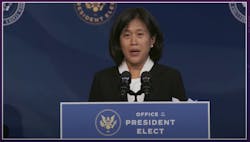Biden’s Trade Rep Nominee Is Well-Versed in Beijing’s Aggression
Opinion/Analysis
The new Biden administration faces a whirlwind of economic recovery challenges. The COVID-19 pandemic has wreaked havoc on the U.S. economy and millions remain unemployed. And thanks to Chairman Xi Jinping’s actions in China, along with former President Donald Trump's use of unilateral economic leverage—including tariffs—Congress is fully aware that Beijing will not play by any rules except “might makes right.”
The good news is that President Joe Biden appears intent on continuing a strong approach on trade and national security issues. That will invariably mean treating China as both a great power rival and a nation that should be held accountable for its genocidal behavior and economic predation.
Helpfully, Biden has nominated Katherine Tai to be the new U.S. Trade Representative (USTR). Tai, who most recently served as chief trade counsel for the House Ways and Means Committee, is an excellent choice—a trade lawyer who understands the need for industrial policy in a post-COVID recovery. She also understands that trade agreements should not be allowed to impede necessary domestic economic programs.
Tai is well-versed in Beijing’s aggression. From 2007 to 2014, she served in the USTR's Office of General Counsel. And starting in 2011, she was chief counsel for China trade enforcement. Part of her work in that time focused on bringing trade cases before the World Trade Organization (WTO).
Essentially, Tai has had a front row seat during past attempts to use WTO processes and bilateral dialogue to achieve President Obama’s global goals. At that time, the conventional wisdom was that China merely needed some “persuasion” to succumb to the inevitable—and become more like western capitalist democracies.
There is little risk that Tai will naively jawbone with Chairman Xi’s team, or pursue WTO cases that continually fail to produce a helpful outcome. And President Biden has shown no indication that he intends to remove Section 301 tariffs imposed by Trump on Chinese goods.
Harvard professor Mark Wu, designated as a USTR Senior Advisor, is also very skeptical that the WTO will be useful to U.S.-China relations anytime soon. And the economists and journalists who made dire predictions of inflation and recession due to Trump’s tariffs have been so discredited as to no longer factor, if Biden opts to become even more aggressive on trade.
The renegotiation of NAFTA to become the USMCA was a first step in recognizing that stateless multinationals need sticks, not merely carrots, to relocate production to the U.S. for the benefit of American workers. Tai understands this since she participated in writing USMCA rules requiring automotive content with more high-wage labor.
Tai has also seen how a persistently overvalued dollar frustrated both Obama’s goal of doubled exports and Trump’s subsequent goal of narrowing the U.S. trade deficit. Many countries, especially in Asia, do not let international capital traders set the value of their currencies. Instead they manage their exchange rates to assist with economic strategy. The U.S. has failed to learn that lesson, and manufacturing workers have suffered as a result.
Tai, as a Ways and Means Trade Counsel, certainly learned that typical trade policy tools are often impotent in the face of systematic currency misalignment. President Trump’s tariffs were extremely important for many industries, but they could not overcome a strong dollar that made U.S. goods, services, and labor more expensive globally. President Biden’s team has shown that it understands this issue with the appointment of Brad Setser—a currency expert and former Treasury official—as a senior advisor to the U.S. Trade Representative.
The Senate Finance Committee will soon hold a hearing on Ms. Tai’s nomination. It’s not yet clear whether all the members of the committee have revised their views from the free-trade optimism of the 1990s. Some may still call for illusory “fair trade” or hope to pursue an analytically impossible “level playing field.”
China doesn’t seek a level playing field. And neither does Europe. They play to win. National interests guide their actions, not allegiances to lofty phrases that diplomats may periodically utter.
Tai is a good choice to lead U.S. trade efforts away from the “let’s get the next trade agreement signed” philosophy of the past. She is well-equipped to make sure that U.S. trade strategy wins the battle for good jobs and industries rather than serve stateless multinationals and the Davos elite.
Michael Stumo is CEO of the Coalition for a Prosperous America.
